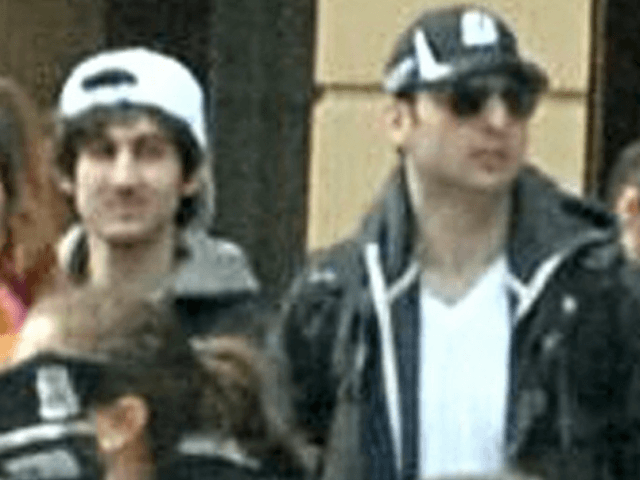The Washington Post recently published a lengthy review of a book about Tamerlan and Dzhokhar Tsarnaev by Masha Gessen, entitled The Brothers: The Road to an American Tragedy. The first problem with this book is the title.
The Boston Marathon bombing was an atrocity, not a “tragedy.” It was not a force of nature. Jihadists planted those bombs deliberately–jihadists raised by a shrieking Islamist mother who was expelled from the country after being arrested for shoplifting.
To her credit, reviewer Asra Q. Nomani finds the book’s case for collective guilt unconvincing, and after offering some observations from her own experience as the daughter of Muslim immigrants from India, she criticizes Gessen for offering “a narrative of Muslim immigrant victimhood” instead of “a deep analysis about overcoming the challenges of assimilation.” The victimhood narrative is capped off by a chapter that entertains conspiracy theories about how the Tsarnaevs were framed, or used as puppets by the FBI, despite Dzhokhar Tsarnaev’s confession of responsibility for his crimes and jihadist intent.
When the simple truth fits into a paragraph, it becomes difficult to write a 273-page book, so of course, we’re invited to blame ourselves for the Tsarnaev brothers. If only the brothers didn’t have such a “difficult experience adjusting to immigrant life in America,” as Nomani’s review puts it, they might not have become terrorists. Their story is supposed to be troubling because “Gessen contends that the United States was as responsible as the misguided youths for the explosions near the marathon finish line that killed three and injured more than 260.”
As Nomani points out, the details of the Tsarnaev’s history in America present an experience not radically different from that of countless immigrants who did not become terrorists. Plenty of opportunities were made available, but the Tsarnaev clan seemed uniquely determined not to take proper advantage of them:
Gessen describes the Tsarnaevs’ early immigrant days in a section aptly called “Dislocation,” with chapters titled “Love,” “Wandering” and “Dreaming of America.” These titles could easily decribe [sic] the early experiences of many immigrant families. The Tsarnaevs hoped for a better life here; they sought to escape the long, troubled history of the Chechen region, which has been riven by separatistism, Russian aggression and periods of war.
In America, the Tsarnaev family — mother, father, two sons, two daughters — struggled after arriving in 2001. Gessen takes us through this dark reality in a section titled “Becoming the Bombers,” in which she chronicles “a decade of broken dreams.” Here we see the financial and psychological pressures that force some immigrants to rely on the kindness of strangers, the charity of the state and the kinship of fellow immigrants. The family found a “miracle,” Gessen writes, in a Cambridge, Mass., former Peace Corps volunteer, Joanna Herlihy, who provided the family with an apartment, introductions and a lot of patience, as the Tsarnaevs broke promises and missed rental payments. At this time, younger brother Dzhokhar was “the sweet kid, the kid everyone loves,” the author writes.
Despite the assistance, the Tsarnaev family “witness[ed] the slow and catastrophic demise of a whole set of immigrant dreams,” Gessen writes. Things began to crumble as the brothers’ drug use picked up. “Pot was the scourge,” she explains. “Each member of the Tsarnaev family was descending into a separate personal hell,” Gessen writes. Media accounts have chronicled run-ins with police over alleged shoplifting, counterfeit money, marijuana possession and intent to distribute.
The remorseless quest to hold Western civilization guilty for all injustice, forever, obstructs the rational discussion of toxic competing ideologies. That is the origin of these lectures about how we are all responsible for a vicious Islamist who murders and maims hundreds of people, including children, and writes a jihad message on the inside of the boat where he hid after lobbing bullets and bombs at the police.
Assimilation is a two-way street. The host society and its laws play an important role, but so does the eagerness of new immigrants to adapt and embrace their adopted homeland. Our dominant media and academic culture treats America as a uniquely unjust nation with no right to expect anything from immigrants, or even sizable maladjusted portions of the native-born population. Low expectations lead to unsatisfactory outcomes. Some new arrivals feel neither enticement nor pressure to assimilate, so they choose not to. That was clearly the case with the Tsarnaevs:
The family was experiencing a common trauma of the immigrant arc: grief over losing a former life. Years after leaving their homeland, Gessen writes, “it was as though the Tsarnaevs had never come to America.” Peering into their American home, one would see “the look every Chechen living room had.”
If the loss of their “former life” was such a source of grief, they should have returned to it long ago and spared the good people of Boston much agony.
Notably absent from the analysis of the Tsarnaevs as a failure of American assimilation is their uncle, Ruslan Tsarni, who made a splash by declaring the boys “losers” and saying their actions “put a shame on our entire family, and the entire Chechen ethnicity.” He said he taught his own kids to love America because it gives everyone a chance “to be treated as a human being.”
Tsarni dropped off the media radar screen after that, but last October he did a phone interview with Newsweek, and his opinion of his nephews hadn’t softened a bit. He called them “bastards” and “evil pieces of s**t,” and said that if he saw their mother today, he would “simply smash her face.”
Any chance Uncle Ruslan will write a book about his immigrant experience?

COMMENTS
Please let us know if you're having issues with commenting.